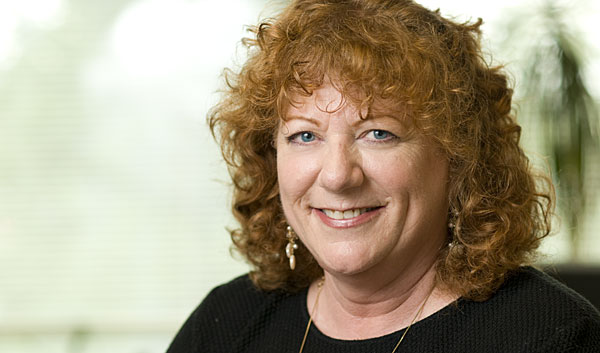Department manager honored with 2008 Marsh O’Neill Award
Every year, the Office of the Vice Provost and Dean of Research recognizes the role staff play in supporting research at Stanford through the Marsh O' Neill Award. Since its inception in 1990, 27 employees have been honored for work that the faculty around them deem indispensable, and this year is no exception.
Peche Turner, the administrative manager of the Computer Science Department, is, among other things, the go-to person for questions regarding the Oracle financial system. In other words, the innovations out of that department—from computer-generated imagery featured in blockbuster movies seen around the world to advances in artificial intelligence that have helicopters whirling around the Oval on autopilot—would never have gotten off the ground without her help.
In nominating Turner, whose first name sounds just like "peach," computer science Professor Leonidas Guibas described her as "the pillar on which much of the department's functioning rests" and wrote that "Peche is the ultimate authority on research administration."
Given her career at Stanford, the praise should come as no surprise. Turner first came to the university in 1976. She was hired as an administrative assistant to the late Professor Wolfgang "Pief" Panofsky, the world-renowned scientist who led the creation of what was formerly known as the Stanford Linear Accelerator Center and served as its director until 1984.
Turner said the temporary staffing agency that placed her at SLAC knew nothing about the facility and described it as a toy factory. At the time, Turner was literally coming in from the cold, having spent the previous six months living in a pup tent in Alaska, where she was working on the pipeline.
"Pief was one of the greatest men I ever knew. He was very interesting, really energetic, a real people person," Turner said. "I still think of things he showed me—sort of by example—that I try to apply in how I lead the department … how you treat people, how you address people, with respect and dignity."
While working in Panofsky's office, Turner also provided support to Sidney Drell, the emeritus professor and founding faculty member at SLAC who served as its deputy director until 1988. Turner recalled how Drell would read letters into a Dictaphone at night and leave the recordings for her to transcribe the next day.
"In between letters, he'd make up a little jingle and sing me a little song," said Turner, who, at the time, had just earned a bachelor's degree in psychology and knew little about the field she just entered. "He'd stop what he was doing and come over and explain black holes and things about physics."
After nine years there, Turner was much more comfortable with technological terms and tools and accepted a job at SRI International. She was there from about 1984 to 1992, initially doing research analysis and later generating electronic reports. Her work focused on then-burgeoning sectors such as computer security and telecommunications.
The recession forced Turner and many other employees at SRI out of a job. But having accumulated a rich array of technological skills and knowledge, Turner soon landed a job back on the Farm as administrative manager of the Knowledge Systems Lab in the Computer Science Department. And then in 1996, when the department's administrative manager at the time stepped down, Turner was well equipped to take over.
"It's a building body of knowledge and skills," Turner said. "The world of sponsored research has been getting more and more complex for those of us who support it and who try to make it happen and provide the environment for the research to happen."
Now, Turner says, her passion lies in passing along her expertise. Currently, the department does about $20 million a year in sponsored research, which is enabled by more than a dozen administrative support staff who at one point or another needed training on Stanford's financial system.
"It's a really important piece of the whole flow, because these are the people who have their hands on the details," Turner said. "They're the ones who can see a problem and who actually code the different transactions and who are watching the money flow on a day-to-day basis."
But beyond the support she provides to faculty and staff, Turner also is there for the students—whether they need help getting funding, are confused about how to approach their adviser or "just want to sit and come talk to Mom for a while."
Turner will be honored at a reception from 4 to 6 p.m. Wednesday, Nov. 19, at the Faculty Club. The Marsh O'Neill Award also comes with a $5,000 cash prize and is named after Marshall D. O'Neill, associate director of the W. W. Hansen Laboratories from 1952 to 1990. Upon his retirement that year, O'Neill became the award's first recipient.
For more information about O'Neill and all the winners since, go to http://dor.stanford.edu/Marsh/.


Share This Story